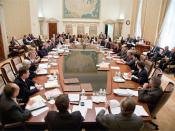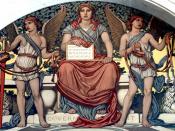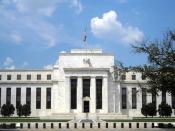The Monetary and Fiscal Policies, although controlled by two different organizations, are the ways that our economy is kept under control. Fiscal Policy is defined as the use of government spending and revenue collection to influence the economy. Monetary policy however is the regulation of the money supply and interest rates by a central bank, such as the Federal Reserve Board in the U.S., in order to control inflation and stabilize currency. Although these two policies are meant to help stabilize the U.S. economy, both the fiscal and monetary policies, look like from past results, requires some change especially the fiscal policy.
In looking at the structure of Monetary and Fiscal policies, it must be understood how the two relate to each other within the government structure. The Federal Open Market Committee - FOMC - is the most important monetary policy-making body of the Federal Reserve System. It is responsible for the formulation of a policy designed to promote economic growth, full employment, stable prices, and a sustainable pattern of international trade and payments.
The seven Board members constitute a majority of the 12-member Federal Open Market Committee, the group that makes the key decisions affecting the cost and availability of money and credit in the economy whose decision-making increased the inflation rate by 1.5%. The other five members of the FOMC are Reserve Bank presidents, one of who is the president of the Federal Reserve Bank of New York. The Board sets reserve requirements and shares the responsibility with the Reserve Banks for discount rate policy. The FOMC is the policy arm of the Fed and the tasks of the Federal Reserve are to supervise banks, fixing maximum rates of interests.
The U.S Treasury, though it aids in much of the monetary management, represents the fiscal sector,


